人教版高中英语必修二unit3+Computers+教案3.doc
英语必修2人教版教案:Unit 3 Computers 新人教版必修2

新课标人教版 Unit 3 Computers 计算机核心词汇1.Where can I____________(下载)the exercises from the Internet?2.More problems like those at the nuclear power plant are certain to____________(出现).3.During the winter holidays,I____________(辅导)some students for English exams.4. They achieved their____________(目标)of increasing sales by five percent. 5.It is such a hard problem that it is impossible for me to____________(解决).6.Money does not always bring____________(幸福).7.These changes are due to an increase in the carbon dioxide in the atmosphere since the beginning of the Industrial____________(革命).8.There is another kind of beauty that has nothing to do with____________(外貌),but comes from the heart.9.It is just her childhood experiences that affect her____________(性格)and later life.10.After the president made an official announcement,he expressed his____________opinion.____________speaking,I agreed with his opinion.(personal) 11.I would like to____________for the job advertised in the newspaper,so I have sent my____________before July 20,2010.(apply)12.Can you say that dolphins are much more____________than other animals?Well,they are animals of high____________and they can communicate.(intelligent)1.download2.arise3.coached4.goal5.solve6.happiness7.Revolution8.appearance9.character10.personal;Personally11.apply;application 12.intelligent;intelligence高频短语1.________________ 从……时起2.________________ 结果3.________________ 如此……以致于4.________________ 在某种程度上5.________________ 在……的帮助下6.________________ 处理;安排;对付7.________________ 看守;监视8.________________ 共有;共用9.________________ 弥补10.________________ 毕竟1.from...on2.as a result3.so...that4.in a way5.with the help of6.deal with7.watch over8.in common9.make up 10.after all重点句式1.____________,I was made smaller.随着时间的流逝,我被做得更小了。
人教英语必修二Unit3Computers教案3

Unit 3 Computers
ExtensiveReading
The General Idea of This Period:
This period includes revision of the text,Reading and speaking on Page 22、Reading task on Page 58.In this period the students will be involved in a speakingactivity about designing an android after reading the story of Andy,and learn something about the performances of a sporting robot of the 22nd century,Hua Fei in 78th Olympics and 79th Olympics,so that the students will not only improve their reading and speaking,but also their creative thinking.
Talk about the different ways of designing the robots.
【人教版】高中英语必修二:Unit 3 Computers 教案
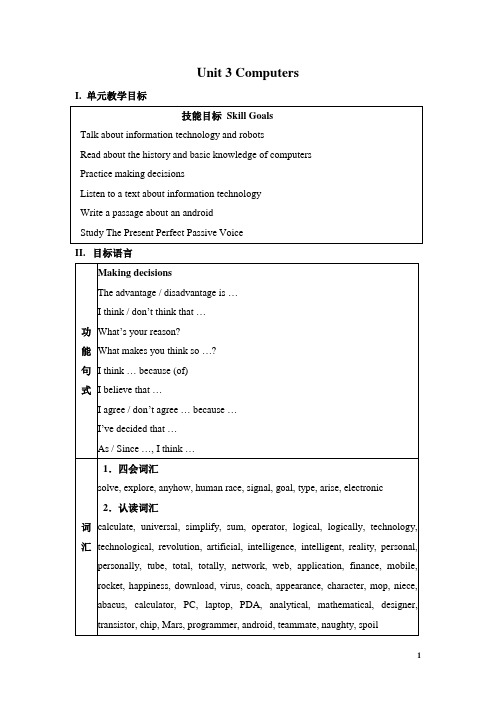
Unit 3 Computers I. 单元教学目标II. 目标语言III. 教材分析与教材重组1. 教材分析本单元以computers为话题,旨在通过单元教学,综合听、说、读、写等多种形式,使学生了解计算机和信息技术的产生和发展过程及其在我们的学习、工作、娱乐等生活中所起的重要作用,激发学生对信息技术的兴趣。
1.1 Warming up提供几幅与计算机有关的图片,形象地说明了计算机的发展历程,并用三个问题引发学生对这一话题的思考,从而起到热身的作用。
1.2 Pre-reading根据文章内容预设问题,检查学生对computers相关知识及应用的了解。
学生对computers的了解可能参差不齐,这更能激发学生想获取更多知识的欲望,从而引出下面的阅读文章——WHO AM I?。
1.3 Reading中以别致的标题WHO AM I?引起学生的好奇心,使学生迫不急待地阅读这篇文章,并判断出“I”是computer,从而对文章的内容印象更深刻。
文章以第一人称的形式按时间先后顺序讲述了computers的产生、发展和现状,并用拟人化的口吻表达了computers乐于为人类服务的精神。
1.4 Comprehending 1 通过scanning的方式完成反映计算机发展历程的时间进程;2 通过填表的形式帮助学生宏观梳理文章结构,找出每个段落的主题句(论点)及具体的支持性论据;3 是读后讨论,要求学生结合自己的生活实际讨论计算机如何改变了我们的生活。
1.5 Learning about language分词汇(Discovering useful words and expressions)和语法(Discovering useful structures)两大部分。
Discovering useful words and expressions 1 根据单词释义写出相对应的词汇,考查学生对WHO AM I? 文章中的重要词汇及短语的理解。
最新人教版必修二unit 3《computers》教案.doc

河北省康保一中英语组高一年级集体备课教案主备课人: 殷桂雁参加人:王培珍杨静慧安秀云马艳丽郝康李纬周燕娜备课时间: 2010年11 月17日知识目标:Topic:Information technology ; history and basic knowledge of computers; robots New words: calculate universal, simplify, sum, operator, logical, logically, technology revolution artificial intelligence intelligent solve reality personal personally tube total totally network web application finance mobile rocket explore anyhow goal happiness download virus signal type coach arise electronic appearance character mop nicePhrases;from…on as a result so...that human race in a way with the help of deal with watch overSentence patterns ;1 making decisionsI think /I don’t think that…I believe that…I’ve decided that…Let’s decide…let’s make a decision2 ReasoningThe advantage/disadvantage is …I agree/don’t agree…because …Give me your reasons:First……second.What makes you think so?As/since……,I think……Grammar :现在完成时态被动语态的建构和用法Over time I have been changed quite a lot.First as a PC and then as a laptop , I have been used in offices and hones since the 1970sSince the 1970s many new applications have been found for meI have also been put into robots and used to make mobile phones as well as help with medical operations能力目标:让学生学习用英语表达自己的观点并进行简单的理由阐述及做出决定,并能按时间先后顺序来描述某事。
最新2020年人教版高一英语必修二教案《Unit 3 Computers》.doc

人教版高一英语必修二教案《Unit 3 Computers》教案【一】教学准备教学目标1. To practise listening comprehension.2.To practise making decisions and reasoning教学重难点1. To practise listening comprehension.2.To practise making decisions and reasoning教学工具课件教学过程Step1. revision1. check the homework exercises.1). It has been reported that children will be offered free education.It has been reported that free education will be offered to children.2). It has been said that we will be offered the latest computer science course book.It has been planned that the latest computer science course book will be offered to us.3). I have been told by Peter that I will be lent his notebook computerfor a week.I have been told by Peter that his notebook computer will be lent to me for a week.2. Question: What can computers be used as?Step2. Lead-inAs we know, science and technology is developing very fast and computers have become smaller and smaller. They have been used in many fields. So, the 21st century is the century of information technology What does it mean? Does information technology/ IT only mean things like computers? Of cause not. Actually, it means more than computers. Computers are just one kind of IT. What else do you know is part of IT?(TV, radio, CD-ROM, DVD, books……)Step3. Listening (SB)1. Pre-listening: What are the changes brought by different forms of IT ?What are the advantages and disadvantages of them ?2. While-listening:Go through the chart and make sure the students look at the chart before they listen to the tape. (This is to sharpen their attention and listen for the answers. This will also help them get the gist of the text.) Then Listen to the tape and finish filling in the chart. (If necessary, play the tape for several times.)Say: After listening to their talk, we know all kinds of IT have both disadvantages and advantages.Let’s check the answers together.Type of IT Advantages DisadvantagesTV You can both listen and watch. You cannot write to friends.Web You can find information. It is very expensive.Radio You can listen to English. You cannot watch a film.Book You can get information. Sometimes it is out of date.3. Post-listening:1) (pair work): decide which type of IT is best for you to use right now. Make your choice and give your reasons by using the following expressions.I think that….In my opinion, ….I believe that….I agree because….I disagree because….I’ve decided that….2) (group work): Discussion :Computers are useful and have brought us lots of good things, but they also cause bad effects. What attitude should we have towards the computer? (Make good use of it but never get trapped by it.) Step4. Speaking1. Pre-speakingSay: From what we have learn, we should admit that computers and the web have a great influence on the school education as well as people’s life. It has come into people’s everyday life and many families hold computers in their homes. Now there is a task for you.2. While-speaking1) Situation: You have been asked by your parents to help choose computers for your home. You and your friend have looked at several computers. Talk about the special things each computer can do. Make a decision about which kind of computer to buy and explain why.Information input: Show students some pictures of different computers (desktop computer 特点______________4.科技;工艺_______________5.目标,目的n. ______________6. 出现;发生vi. ______________7. 解决;解答vt. _______________8.类型,打字v.信号._________10.无论如何,即使如此adv. ______二.写出下列单词的变化形式1. operator n. 操作员; 接线员→_____________v. 操作; 经营→____________n. 操作; 经营2. technology n.工艺; 科技; 技术→_______________ adj. 科技的3. intelligence n.智力; 聪明; 智能→_________adj.智能的; 聪明的4. appearance n. 外观; 外貌; 出现→________________vi. 出现5. application n. 应用; 用途; 申请→_______________v. 应用; 申请→___________n. 申请人; 求职者6. explore vt. 探测→___________n. 探险家; 勘探者→_____________ n. 探索7. personal adj. 私人的; 个人的;→________adv. 就个人而言; 亲自→_________n. 个性; 人格;三、用所给词的适当形式填空(1)Can you say dolphins are much more ____________than other animals?Well, they are animals of high _____________. (intelligent)(2) She expressed her _________ opinion yesterday. ____________ speaking, I agreed with what she said. (personal)(3) Any ___________ who would like to _____________ to becomeanassistant in our company should send us an ___________ .(apply)四、语境助记——词不离句,句不离段With the electronic technology revolution going on,simplified calculation is solved in the application on finance by universal exploration. Our goal of making life happier is certain to be realized through man’s intelligence.五、翻译下列必背短语?1.在某种程度上_______________2.依…看;据…认为_____________3.从…时候起_______________4.结果_______________5.处理;安排;对付____________6.弥补,补足;整理,编造_________7.毕竟_______________?8.看守,监视_______________9.在……帮助下_______________?六.根据句子意思写出单词的正确形式。
人教新课标高中英语必修二Unit 3 Computers教案
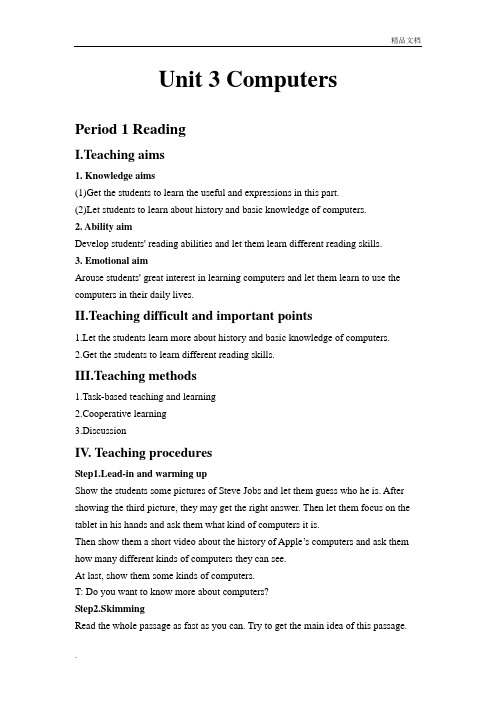
Unit 3 ComputersPeriod 1 ReadingI.Teaching aims1. Knowledge aims(1)Get the students to learn the useful and expressions in this part.(2)Let students to learn about history and basic knowledge of computers.2. Ability aimDevelop students' reading abilities and let them learn different reading skills.3. Emotional aimArouse students' great interest in learning computers and let them learn to use the computers in their daily lives.II.Teaching difficult and important points1.Let the students learn more about history and basic knowledge of computers.2.Get the students to learn different reading skills.III.Teaching methods1.Task-based teaching and learning2.Cooperative learning3.DiscussionIV. Teaching proceduresStep1.Lead-in and warming upShow the students some pictures of Steve Jobs and let them guess who he is. After showing the third picture, they may get the right answer. Then let them focus on the tablet in his hands and ask them what kind of computers it is.Then show them a short video about the history of Apple’s computers and ask them how many different kinds of computers they can see.At last, show them some kinds of computers.T: Do you want to know more about computers?Step2.SkimmingRead the whole passage as fast as you can.Try to get the main idea of this passage.A. The computer wants to find “who he is”.B. The function (功能) of the computer.C. The computer becomes popular around the world.D. The history and the applications of the computer.Find out the topic sentence of each paragraph and underline them.Step3. Careful-reading Para 1ScanningLet the students read this paragraph carefully and try to finish the following char.T: How could these changes become possible?Step4. Careful-reading Para 2Let the students read paragraph 2 quickly and find the answer to this question. After check the answer, give them one minute to find the five different ways of memory for computers in different periods of time.Step5. Careful-reading Para 3Since the memory of computers has been improved greatly, will them become more powerful and can be used in more fields?Now read the last paragraph and find out the new applications of computers.Step6. Further Reading1.The passage is written by_______ order?2. What is the most used rhetoric (修辞法) in this passage?A. simile(明喻)B. personification (拟人)C. metaphor (暗喻)3. In what ways have computer been changed?Ask some students to summarize. If they have any difficulty, give them some hints. Step7. Activity: Be the next Jobs!We have learned the history of computers and seen the great development of computers. What will the computers be like in the future? Do you want to design your computers as Jobs did? Now try to design your computers.For example:This is the new computer designed by our company.It is very small and transparent(透明的). You can even put it into your pocket. (Shape/color)It has a free-internet in it. You can… (Applications/functions)It only costs you … (Price)Give the students five minutes to prepare and invite some of them to show their ideas. Step8. Homework1. Try to retell the history of computers.2. Read the passage carefully and underline the difficult sentences.。
高中英语必修二人教版:Unit+3+Computers+教案3.doc
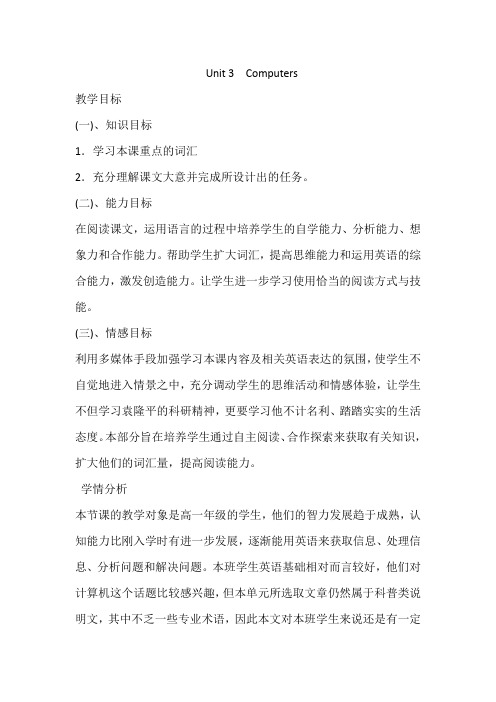
Unit 3Computers教学目标(一)、知识目标1.学习本课重点的词汇2.充分理解课文大意并完成所设计出的任务。
(二)、能力目标在阅读课文,运用语言的过程中培养学生的自学能力、分析能力、想象力和合作能力。
帮助学生扩大词汇,提高思维能力和运用英语的综合能力,激发创造能力。
让学生进一步学习使用恰当的阅读方式与技能。
(三)、情感目标利用多媒体手段加强学习本课内容及相关英语表达的氛围,使学生不自觉地进入情景之中,充分调动学生的思维活动和情感体验,让学生不但学习袁隆平的科研精神,更要学习他不计名利、踏踏实实的生活态度。
本部分旨在培养学生通过自主阅读、合作探索来获取有关知识,扩大他们的词汇量,提高阅读能力。
学情分析本节课的教学对象是高一年级的学生,他们的智力发展趋于成熟,认知能力比刚入学时有进一步发展,逐渐能用英语来获取信息、处理信息、分析问题和解决问题。
本班学生英语基础相对而言较好,他们对计算机这个话题比较感兴趣,但本单元所选取文章仍然属于科普类说明文,其中不乏一些专业术语,因此本文对本班学生来说还是有一定难度。
重点难点(1) 本单元的生词和短语;(2)通过学习本单元,使学生了解计算机的发展历程,及其在当今社会的广泛运用;(3)鼓励学生用英语表达自己的观点,进行简单的推理和做出决定。
(1) 教会学生通过时间的先后顺序来表达一件事;(2) 使学生了和掌握现在完成时的被动语态的用法;(3) 指导学生按类别归纳整理词汇,让学生学会有效地记忆词汇的方法;(4) 引导学生发现本单元重点语言结构,让学生自己发现并感悟相关的语言规律,在学习过程中培养语感。
教学过程活动1 【讲授】Step 1 Warming up Guessing game 请学生看PPT上的图片,说出物品的英文名称。
若学生说不出个别物品名称,教师提供帮助。
然后请学生两人一组讨论问题。
•What do these pictures have in common? •What do they tell you about the development of computers? •What do you think will be the next development ? 通过看图片和回答问题引出本单元话题。
高中英语Unit3Computers教案新人教版必修2

Unit 3 Computers类别 话题词汇词组、 短语功能语法随堂练习教学目的和要求〔〕Information technologyhistory and basic knowledge of computers robotscalculate calculator PC notebook common analytical simple simple-minded technology technological revolution universal mathematical artificial intelligence anyway totally network truly race birth IT advantage disadvantage type disagree choice material personally create coach move arise brain mop wanderin common in one ’s opin ion go by so ... that ... deal with humanrace in a way make up with the help of after all watch over1. 做出决定〔 Making decisions〕I think that ... In my opinion ... I believe that ...Let ’ s make our decision.I ’ ve decided that ...2. 推理〔 Reasoning 〕The advantage/disadvantage is ...What ’s your reason? Why do you think so?I think this one is better because ...I don ’t like this one because ...现在完成时的被动语态结构和用法I have been made smaller and smaller.I have been used by millions of people.I have truly been built to help the human race.1、 Go over the story and discuss with your partner who the speaker is in thisstory.Now write down three sentences from the story to support your idea. It is a computer because it describes :Itselfas the analyticalmachine designed by CharlesBabbage 〔 which was the firstdesign of a computer 〕. Then in 1822 I was builtas an AnalyticalMachine by CharlesBabbage.Alan Turing as its real father 〔 and he designed thefirstreal computer 〕 . “ Myreal father was Alan Turing ...〞Having artificial intelligence〔 which only computers have 〕 . People have naturalintelligence.“ However, people thoughtI was simple-mindeduntilthey discoveredI had ‘artificial intelligence’ . 〞课程标准要求掌握的工程 ;Teaching aims and demands2、 Look at the timeline below.Fillin the blanks with information from the reading above.Timeline1642: The computer began as a calculating machine.1822: The Analytical Machine was made by Charles Babbage.1936: Alan Turing wrote a book to describe how computers could be made.1960s:Computers had new transistors and became smaller.1960s:The first family of computers was connected to each other.1970s:Computers were brought into people’ s homes.Now: Computers connect people all over the world together.课堂笔记1、 I know this sounds very simple,but at that time it was a technological revolution.我知道这听起来很简单,但是在那个时候这却是一项技术革命。
人教版高中英语必修二UNIT3COMPUTERS教学设计
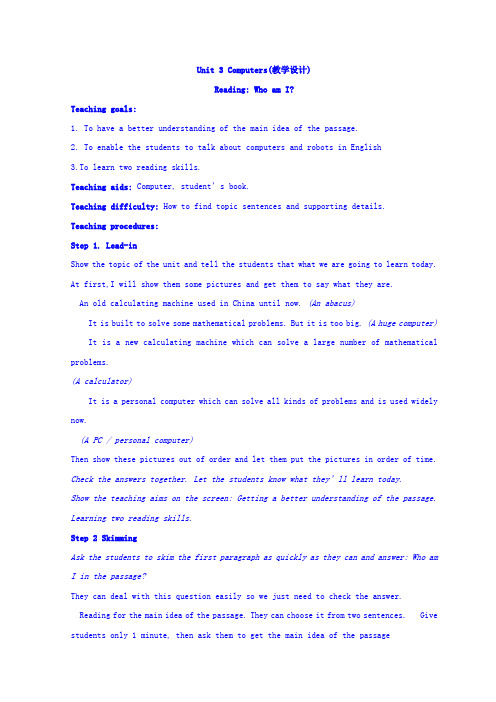
Unit 3 Computers(教学设计)Reading: Who am I?Teaching goals:1. To have a better understanding of the main idea of the passage.2. To enable the students to talk about computers and robots in English3.To learn two reading skills.Teaching aids: Computer, student’s book.Teaching difficulty: How to find topic sentences and supporting details.Teaching procedures:Step 1. Lead-inShow the topic of the unit and tell the students that what we are going to learn today. At first,I will show them some pictures and get them to say what they are.An old calculating machine used in China until now. (An abacus)It is built to solve some mathematical problems. But it is too big. (A huge computer) It is a new calculating machine which can solve a large number of mathematical problems.(A calculator)It is a personal computer which can solve all kinds of problems and is used widely now.(A PC / personal computer)Then show these pictures out of order and let them put the pictures in order of time. Check the answers together. Let the students know what they’ll learn today.Show the teaching aims on the screen: Getting a better understanding of the passage. Learning two reading skills.Step 2 SkimmingAsk the students to skim the first paragraph as quickly as they can and answer: Who am I in the passage?They can deal with this question easily so we just need to check the answer.Reading for the main idea of the passage. They can choose it from two sentences. Give students only 1 minute, then ask them to get the main idea of the passageStep 3 Reading for specific information.At the beginning, explain to the students what topic sentence and supporting details mean. Students can read the explanation on the screen by themselves.As the passage is a bit difficult, I’ll lead the students to find out the topic sentence and supporting details of paragraph 1. Add explanations where necessary.Next, the students should be able to find out the topic sentences and supporting details of paragraphs 2 and 3. Give them several minutes.After finishing the tasks, make a simple summary.As we talk about the development of something, time is very important for us to understand better. Now let’s complete the timeline on page 19. Give them three minutes to finish it individually.A chain of events showing the development of computer / Changes of the machineTimeline1642: ____________________________________________::the Analytical Machine was made by Charles Babbage.1936:_______________________________________________________________________1960s:______________________________________________________________________: the first family of computers was connected to each other.1970s: ______________________________________________________________________Now:_______________________________________________________________________In order to help the students get a better understanding, I’ll show them a short video about the development of computers.Step 4 Post-readingNow we know the development of computers(show the pictures in the right order). Can you guess What’s Next?Give students 2 minutes to talk with parters about What will robots do for us in the future?Then ask some students to share their opinions with us.Summarize like this: Robots are useful in our daily life. For example, it can help us cook, clean the room, wash clothes and accompany us . Also, they can direct the traffic,carry out operations and even do some dangerous jobs.Blow the short summary, I’ll show them two sentences and they are supposed to decide which one is the topic sentence:A.Robots can do a lot of things for us.B.Robots have changed a lot.Step 5 SummaryToday we have learnt:1). the development of computers2) how to find topic sentences and supporting details.Encourage the students to use the reading skills in study.Step 6 Homework1. Read the text aloud and try to retell it in order of time.2. Read the passage again. Underline the sentences that you don’t understand and try to solve the problems using context clues and the dictionary.。
最新人教版高一英语必修2-Unit3-Computers全单元教案
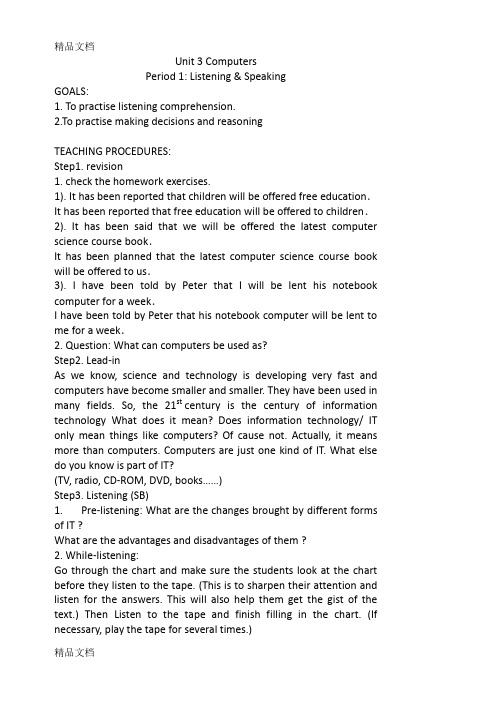
Unit 3 ComputersPeriod 1: Listening & SpeakingGOALS:1. To practise listening comprehension.2.To practise making decisions and reasoningTEACHING PROCEDURES:Step1. revision1. check the homework exercises.1). It has been reported that children will be offered free education.It has been reported that free education will be offered to children.2). It has been said that we will be offered the latest computer science course book.It has been planned that the latest computer science course book will be offered to us.3). I have been told by Peter that I will be lent his notebook computer for a week.I have been told by Peter that his notebook computer will be lent to me for a week.2. Question: What can computers be used as?Step2. Lead-inAs we know, science and technology is developing very fast and computers have become smaller and smaller. They have been used in many fields. So, the 21st century is the century of information technology What does it mean? Does information technology/ IT only mean things like computers? Of cause not. Actually, it means more than computers. Computers are just one kind of IT. What else do you know is part of IT?(TV, radio, CD-ROM, DVD, books……)Step3. Listening (SB)1. Pre-listening: What are the changes brought by different forms of IT ?What are the advantages and disadvantages of them ?2. While-listening:Go through the chart and make sure the students look at the chart before they listen to the tape. (This is to sharpen their attention and listen for the answers. This will also help them get the gist of the text.) Then Listen to the tape and finish filling in the chart. (If necessary, play the tape for several times.)Say: After listening to their talk, we know all kinds of IT have both1) (pair work): decide which type of IT is best for you to use right now. Make your choice and give your reasons by using the following expression_r_rs.I think that….In my opi nion, ….I believe that….I agree because….I disagree because….I’ve decided that….2) (group work): Discussion :Computers are useful and have brought us lots of good things, but they also cause bad effects. What attitude should we have towards the computer? (Make good use of it but never get trapped by it.) Step4. Speaking1. Pre-speakingSay: From what we have learn, we should admit that computers and the web have a great influence on the school education as well as people’s life. It has come into people’s everyday life and many families hold computers in their homes. Now there is a task for you.2. While-speaking1) Situation: You have been asked by your parents to help choose computers for your home. You and your friend have looked at several computers. Talk about the special things each computer can do. Make a decision about which kind of computer to buy and explain why.Information input: Show students some pictures of different computers (desktop computer & laptop computer & …)Language input: Useful expression_r_rs (Repeat it to strengthenstudents’ ability of use it.)(Pair work )Use the expression_r_rs to support your opinion or challenging other’s opinions.2) Oral report: (individual work )Do an oral report to your father and start your report like this: I looked at many different computers. The one I have chosen is the PEP personal computer. One of the main reasons is that it is suitable for homes. I found that…3. Post-speakingConclusion—What useful expression_r_r do we use to make a decision and reason?(In this way, they can review and use the words and phrases again.) Step5. HomeworkPage 22. writing: Write a report about your choice and try to use the present perfect passive voice as well as the useful words and expression_r_rs that have been mentioned above. in your report.Period 2: Reading and speaking & Writing Goals:1. Learn a reading passage to learn about a football android called Andy.2. Improve students’ reading ability.3. Design an android.4. Write a passage about the problems that the android might have while he/she is serving people. Teaching procedures:Step1: Lead-inShow the first picture and tell the students that computers could be put into androids or robots. Present “android”.Tell the students: Androids are always with us! The students may disagree. Show pictures of Atom and Doraemon. Say: they are androids with magical power.Continue to show pictures of nursery maid androids and tell the students androids can be made to look after humans. Then ask: But can you imagine androids can play football? Maybe you are curious about it. I will show you a video that androids play football.Let the students watch the video and tell them: oday I would like to introduce an android family member to you .His name is Andy. Present the reading passage’s topic: Andy---the Android.Step2: Reading:Let the students read the passage. Carry out the tasks below: Task1: Answer the questions below:1. Who is Andy? What is he good at?(He is an android. And he is good at playing football)2. What helps him to move and think like a human?(His computer helps him to move and think like a human.)3. What does Andy think about the team who beat them last year? Why?(She thinks the team cheated because they had a new kind of programmer, which had just been developed before the competition.)4. What does the programmer do to Andy?(She programs me with all the possible moves she has seen while watching human games.)Task2: Fill in the blanksThe story is about the _____ called ____, who is good at____________. And his__________ makes him think and move like a ______. However, they _____ in the _________ hosted in the USA, because the other team had a new kind of_______. After that, he will ask his programmer to improve his _________ and _______ some new moves.Task3: Language points:1. I think we can work together to create even better software. even = much 用于强调比较的程度2. In a way, my programmer is like my coach.in a way 在某种程度上…in the way 挡道,造成障碍in this way 用这种方法Fill in the blank:1). ________it was one of our biggest mistakes.2). You can finish your work .3). Your bike is .Move it away.3. In this way, I can make up new moves.make up 编写,补上4. After all, with the help of my computer brain which never forgets anything, intelligence is what I’m all about.after all 毕竟with the help of sb./sth. 在…的帮助之下= with one’s/ sth’s help Step3 SpeakingTell the students that we already have many different kinds of androids in our daily life. Show some pictures of androids for different purposes---maid, adventure and work.Then say to the students: Let’s design an android of our own! The following questions and expression_r_rs can help you:*What would you like it to look like?*What are some of the things you would like it to do?*Do you want it to be like a man or a woman, or neither?*How much would it cost?......Get the students to use the following sentences for discussion:I think that…What’s your reason?In my opinion…I have decided that…Sample:A: What would you like your android to look like?B : In my opinion it should look like a bird.A: That sounds interesting. What will it do for you?B: I think it can sing beautiful songs for me day and night.A : Oh, yes! That sounds good. How much is it?B: It doesn’t cost much money because I will make it by myself.A: Really?! Do you want it to be a man or woman, or neither?B : I want it to be a beautiful girl named Kelly.A: Please show it to us some day.B: Oh, No money no talk.Step4 Pre-writingSay: Imagine what problems and delights this android might have to deal with while it is serving you. Try yourself in someone else’s shoes is an important way of understanding how other people feel.Then discuss: You are an android. You work for a family with one child who is very spoiled. The parents want you to do everything for them. The parents are nice, but they often ask you to watch over their child. How do you feel? What would you do if the child asked you to do his/her homework for him/her? Would you ever tell the child “no”?Step5 WritingSay: Write a passage about the result of your discussion! It should contain:What do you have to do?What is the child like?What is the par ents’ requirement of the child?What do the parents want you to do?What does the child want you to do?Then what will you do? How do you feel?Sample writing:Hello everybody, my name is Liu Yan.I am a 321 model android.I work for the Li family. Mr and Mrs Li work very hard too.Mr Li is an architect and designs great tall apartment blocks.Mrs Li is a doctor and has to look after many patients.I remember all the plans for Mr Li's projects and can tell Mrs Li which drugs are the best to give any particular patient. And I also look after their library. I store all the books that they borrow from their school or friends in my brain.Of course my brain is as large as a mountain, so work like that is no trouble to me.I really eat books just like people eat food.The Lis have a child who is very spoiled. He needs me to remember all his school textbooks so that I can do his homework for him.Hejust gives me the information on the subject, what has to be done and the page numbers and I get on with it while he enjoys himself with his friends.Sometimes I don't think it is right to do his homework for him — it's somewhat cheating. However, his parents are very concerned at the pressure of work in school these days.The child has too much homework to do. They like him to go to the key school but they also want him to be able to have hobbies, learn to swim and keep fit! Poor child!So they consider me the most important person in the family after themselves.I am always introduced to their friends and play with visiting children.I am the perfect family academic aid and, although I was not cheap to buy, Mr Li says I was worth every yuan!Step6 AssessmentGet the students to assess their writing ability according to the following the questions:1. Is your composition well developed?2. Are your ideas well organized to the point?3. Do you have a good choice of words and idioms in your writing?4. Do you get a good mastery of complex structures of language?5. What kind of mistakes have you made in your writing?Step5: HomeworkWrite about your discussion. You may begin like this:Hello, everyone. My name is ___. I’m 321 model android. I work for the Li family….Period 3: learning about Language---the Present Perfect Passive VoiceGoals: 1. Learn the Present Perfect Passive Voice.2. Help the students master the way of using the correct voice, telling the differences between the active voice and the passive voice. Teaching Procedures:Step 1: Revision and lead-in1. Check the homework firstEx1:1 totally2 revolution3 artificial intelligence4 birth5 simple-minded6 go by7 deal with 8 network 9 truly 10 anywayEx2:revolution; network; went by; totally; truly; simple-minded; Anyway; deal withEx3:1 totally2 amazed3 exciting4 excited5 cheaply6 unlucky2. Lead-inSay: Are you familiar with these computers? Can you call them? (ask the Ss to distinguish different types of computers.)Do you know these new inventions of computer ?A wrist-worn PC has been invented recently.A pen-like computer has already been developed.(show them some pictures and ask them to make some sentences , using the Present Perfect Passive Voice.)Eg: It’s rather a hot day today! Would you like to have a swim after school ?Have you ever swum in the Blue Water World(蓝色水世界)in the Oriental Suntown (东方太阳城) which has been set up in Taizhou? There a beautiful swimming pool has been built .Many high buildings have been set up.Lots of flowers and trees have been planted.A new bridge has be en completed….Step2: DiscoveringAsk the Ss to discover whether these sentences have something in common.. Help them to learn the useful structure : the Present Perfect Passive Voice.Step3: Discussion : learning the structureGive some explanations1构成:主动语态被动语态现在完成时 have/has done----------àhave/has been doneHe has been sent to study the new technology in the company.The dirty clothes have not been washed.Have the windows been cleaned?How many shopping centers have been built in this city?2. 只有及物动词才有被动语态,不及物动词(词组)没有被动语态, 如:happen, take place,die, appear, disappear, fail, remain, lie, last, sit ,stand, break out, come true, belong to等.如:What has happened to your brother?3.但许多不及物动词加介词或副词构成的短语动词,相当于及物动词,也可以有被动语态。
人教版必修二Unit 3《Computers》word教案
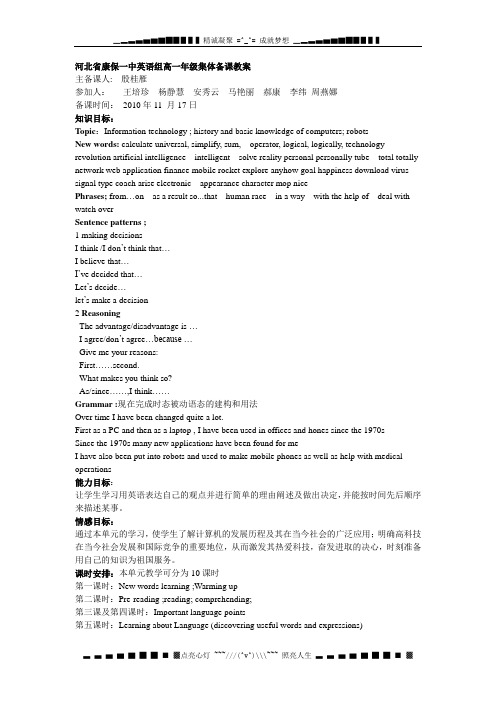
河北省康保一中英语组高一年级集体备课教案主备课人: 殷桂雁参加人:王培珍杨静慧安秀云马艳丽郝康李纬周燕娜备课时间:2010年11 月17日知识目标:Topic:Information technology ; history and basic knowledge of computers; robotsNew words: calculate universal, simplify, sum, operator, logical, logically, technology revolution artificial intelligence intelligent solve reality personal personally tube total totally network web application finance mobile rocket explore anyhow goal happiness download virus signal type coach arise electronic appearance character mop nicePhrases; from…on as a result so...that human race in a way with the help of deal with watch overSentence patterns ;1 making decisionsI think /I don’t think that…I believe that…I’ve decided that…Let’s decide…let’s make a decision2 ReasoningThe advantage/disadvantage is …I agree/don’t agree…because…Give me your reasons:First……second.What makes you think so?As/since……,I think……Grammar :现在完成时态被动语态的建构和用法Over time I have been changed quite a lot.First as a PC and then as a laptop , I have been used in offices and hones since the 1970sSince the 1970s many new applications have been found for meI have also been put into robots and used to make mobile phones as well as help with medical operations能力目标:让学生学习用英语表达自己的观点并进行简单的理由阐述及做出决定,并能按时间先后顺序来描述某事。
信息技术教案:高一英语必修2Unit3Computers全单元教案

信息技术的发展已经深深地嵌入到我们的生活中。
计算机的出现彻底改变了人们传统的生产方式和生活方式。
现代教育不再是仅限于背书和抄板书,而是花费大量的时间和精力去思考、去分析和去实践。
在这样一个信息时代,教师的角色也随之转变。
我们不仅需要教授知识,还需要培养学生的信息能力,帮助他们理解和利用科技并运用它们支持我们的学习和生活。
高一英语必修2 Unit3 Computers全单元教案是一份非常重要的信息技术教案。
这个单元是有关于计算机和互联网的,向学生介绍了计算机的历史和发展,软件和硬件,以及学习计算机和互联网所需的相关知识。
第一课:Computers in Everyday Life这一课介绍了计算机在生活中的应用以及与人们的生活密切相关的一些软件。
我们可以向学生展示各种各样的工具软件,如视频制作、图片编辑、文档编辑、音频制作等等。
我们也可以通过展示计算机硬件的内部结构来引导学生了解计算机是如何工作的。
第二课:The Development of Computers这一课涵盖了计算机诞生以来的漫长历史。
从最初的机械计算器到现代的个人计算机,这里介绍了计算机的种类、发展和特点。
学生能够学习计算机的历史,了解计算机技术的发展和趋势,以及计算机的应用范围。
第三课:Computer and Society这一课程介绍了计算机在社会生活中的应用,并引导学生思考计算机技术对社会的影响,特别是当它开始影响人们的生活、工作和教育时。
我们将会讨论有关网络安全问题,从而让学生了解如何安全地使用计算机。
第四课:Software这一课介绍了计算机系统中的软件,包括操作系统、应用软件、编译器等等。
学生将了解到不同类型的软件的特点,掌握基本的软件使用技巧。
第五课:Data Storage这一课主要介绍了计算机数据存储,包括内存、硬盘等。
学生将学习如何存储、传输和访问数据,并了解如何保护我们的数据。
第六课:The Internet这一课介绍了互联网的原理和应用。
人教版高一英语必修二教案《Unit 3 Computers》

Conclusion—Whatusefulexpressiondoweusetomakeadecisionandre ason?
ห้องสมุดไป่ตู้
精心整理 (Inthisway,theycanreviewandusethewordsandphrasesagain.) Step6Pre-writing
精心整理 Computersareusefulandhavebroughtuslotsofgoodthings,buttheya lsocausebadeffects.Whatattitudeshouldwehavetowardsthecomput er?(Makegooduseofitbutnevergettrappedbyit.)
Gothroughthechartandmakesurethestudentslookatthechartbefore theylistentothetape.(Thisistosharpentheirattentionandlisten fortheanswers.Thiswillalsohelpthemgetthegistofthetext.)Then Listentothetapeandfinishfillinginthechart.(Ifnecessary,play thetapeforseveraltimes.)
Say:Afterlisteningtotheirtalk,weknowallkindsofIThavebothdis advantagesandadvantages.Let’schecktheanswerstogether.
精心整理 TypeofITAdvantagesDisadvantages TVYoucanbothlistenandwatch.Youcannotwritetofriends. WebYoucanfindinformation.Itisveryexpensive. RadioYoucanlistentoEnglish.Youcannotwatchafilm. BookYoucangetinformation.Sometimesitisoutofdate. 3.Post-listening:
高中英语必修二unit3+Computers+教案3
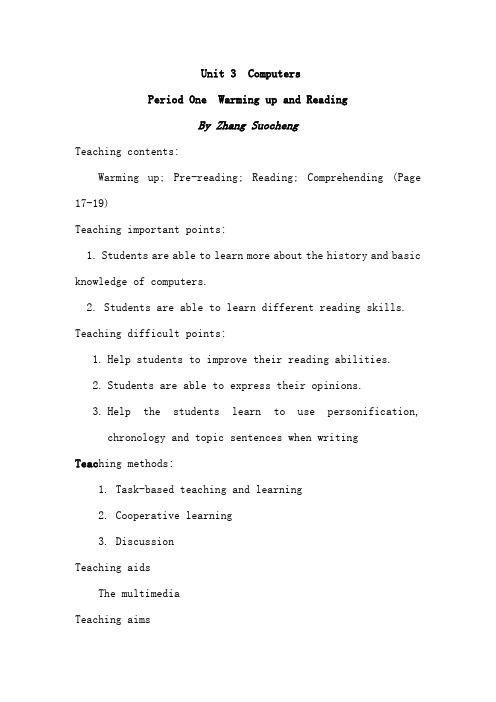
Unit 3 ComputersPeriod One Warming up and ReadingBy Zhang SuochengTeaching contents:Warming up; Pre-reading; Reading; Comprehending (Page 17-19)Teaching important points:1. Students are able to learn more about the history and basic knowledge of computers.2. Students are able to learn different reading skills. Teaching difficult points:1.Help students to improve their reading abilities.2.Students are able to express their opinions.3.Help the students learn to use personification,chronology and topic sentences when writingTeac hing methods:1. Task-based teaching and learning2. Cooperative learning3. DiscussionTeaching aidsThe multimediaTeaching aimsKnowledge aims:1. Students are able to learn the useful new words and expressions in this passage2. Students are able to know basic knowledge about computers.Ability aims:1. Help students to improve their reading abilities.2. Train the students’ability to collect usefulinformation from the Internet by themselves.Emotional aim:Guide the students to work hard to create more wonderful and convenient inventions for human beings.Teaching procedureStep One Warming up1. Talk about the importance of computer and the Internet.2. Cooperative learning: Show some pictures of the development of computers.Questions: 1. What can you see in the pictures?(abacus, calculator, huge computer, PC, laptop, PDA, robot)2. What do you think will be the next development?Discussion (pair work): What do they have in common, in your opinion?Some useful expressions: I think that…In my opinion…I believe that… What’s your reason? Why do you think so?Step Two Pre-readingAsk the students to predict what the text is going to be about from the title and the pictures.Step Three While-readingTask 1: Skimming the passage for the general ideaQ 1: What is the main idea of the passage?This passage is mainly about the history of the development of computers.Q 2. Who am I?I am a computer.Task 2: Scanning for detailed information.Read the passage and finish the timeline below. (Ex. 1 on Page19)Task 3: Listen and read aloudTas k 4: Read the passage again. In pairs find out the topic sentence of each paragraph and the supporting details. (Ex.2 on Page19)Question & Summary: How to find out the main idea of a paragraph quicklyA topic sentence sets out / explains the main idea of a paragraph.A topic sentence is usually the first or the last sentence of a paragraph.Step Four Post-readingTask 5: Guessing gamesFind the word or expression for each of the following meanings from the text according to the context.(Ex. 1 on Page 20)Task 6: True or False?1. The passage mainly tells us the history of the computer.2. The computer was considered simple-minded before it got artificial intelligence.3. Charles Babbage invented the first computer.4. Since its birth the computer has been built to take the place of the human race.Step Five Brief summaryWhat have we learnt in this class?1) some words about computerscalculating machine, analytical machine, universal machine, PC, laptop,tubes, transistors, chips, network, World Wide Web, communications, finance, trade, robots, mobile phones, medical operations, space rockets2)the short history of the development of computersgreat changes in size—from__________ to ___________great changes in memory—from___________to ___________great changes in function—from___________to ___________great changes in application—from___________to ___________3) some scientists relating to computers________________built the analytical machine.________________made the first computer.4) some good methods of writinga. in the first person—personification “Who am I? ”b. in an order of time—chronologyc. topic sentencesStep Six Discussion in groups of fourWork in groups of four and discuss the advantages and disadvantages ofcomputers.Step Seven HomeworkRead the passage again. Underline the words, phrases or sentences that you don’t understand, and try to solve the problems using context clues and the dictionary.Design on the blackboardUnit 3 ComputersPeriod One Warming up and ReadingMain idea of the passage:This passage is about the history of the development of computers.Topic sentences of each paragraph:Paragraph 1: Over time I have been changed quite a lot.Paragraph 2: These changes only became possible as my memory improved.Paragraph 3: Since the 1970s many new applications have been found for me.Summary: What have we learnt in this class?1) some words about computers2) the short history of the development of computers3) some scientists relating to computers4) some good methods of writinga. in the first person—personification “Who am I? ”b. in an order of time—chronologyc. topic sentences。
人教新课标高中英语必修二Unit3Computers教案

Unit 3 ComputersPeriod 1 Read ingI. Teaching aims1. Kno wledge aims(1) Get the stude nts to lear n the useful and expressi ons in this part.(2) Let stude nts to lear n about history and basic kno wledge of computers.2. Ability aimDevelop stude nts' readi ng abilities and let them lear n differe nt readi ng skills.3. Emoti onal aimArouse students' great interest in learning computers and let them learn to use the computers in their daily lives.II. Teaching difficult and important points1. Let the stude nts lear n more about history and basic kno wledge of computers.2. Get the students to learn different reading skills.III. Teaching methods1. Task-based teachi ng and lear ning2. Cooperative lear ning3. Discussi onIV. Teaching proceduresStep1.Lead-i n and warm ing upShow the students some pictures of Steve Jobs and let them guess who he is. After show ing the third picture, they may get the right an swer. The n let them focus on the tablet in his hands and ask them what kind of computers it is.Then show them a short video about the history of Appl'computers and ask them how many differe nt kinds of computers they can see.At last, show them some kinds of computers.T: Do you want to know more about computers?Step2.Skimmi ngRead the whole passage as fast as you csTry to get the main idea of this passage.A. The computer wants to find “who he is ”.B. The function (功能)of the computer.C. The computer becomes popular around the world.D. The history and the applications of the computer.Find out the topic sentence of each paragraph and un derl ine them.Step3. Careful-readi ng Para 1ScanningLet the students read this paragraph carefully and try to finish the following char.T: How could these cha nges become possible?Step4. Careful-read ing Para 2Let the students read paragraph 2 quickly and find the answer to this question. After check the answer, give them one minute to find the five different ways of memory for computers in differe nt periods of time.Step5. Careful-read ing Para 3Since the memory of computers has been improved greatly, will them become more powerful and can be used in more fields?Now read the last paragraph and find out the new applications of computers.Step6. Further Read ing1. The passage is writte n by _____ order?2. What is the most used rhetoric 修辞法)in this passage?A. simile (明喻)B. pers on ificati on (拟人)C. metaphor 暗喻)3. In what ways have computer bee n cha nged?Ask some students to summarize. If they have any difficulty, give them some hints. Step7. Activity: Be the next Jobs!We have lear ned the history of computers and see n the great developme nt of computers. What will the computers be like in the future? Do you want to design your computers as Jobs did? Now try to desig n your computers.For example:This is the new computer desig ned by our compa ny.It is very small an d tran spare nt透明的).You can eve n put it into your pocket. (Shape/color)It has a free-internet in it.You can …(Applications/functions)It only costs you Price)(Give the students five minutes to prepare and invite some of them to show their ideas. Step8. Homework1. Try to retell the history of computers.2. Read the passage carefully and un derl ine the difficult senten ces.。
人教版高中英语必修2 Unit 3 Computers教学设计
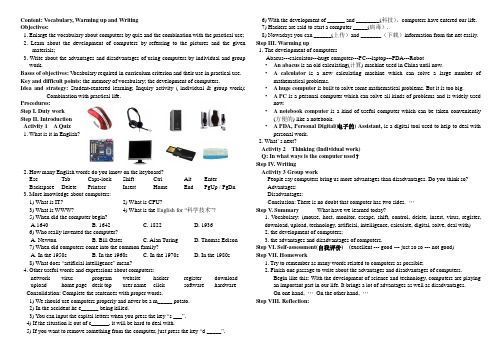
Content: Vocabulary, Warming up and WritingObjectives:1. Enlarge the vocabulary about computers by quiz and the combination with the practical use;2. Learn about the development of computers by referring to the pictures and the givenmaterials;3. Write about the advantages and disadvantages of using computers by individual and groupwork.Bases of objectives: V ocabulary required in curriculum criterion and their use in practical use. Key and difficult points: the memory of vocabulary; the development of computers.Idea and strategy:Student-centered learning; Inquiry activity ( individual & group work);Combination with practical life.Procedures:Step I. Duty workStep II. IntroductionActivity 1 A Quiz1. What is it in English?2. How many English words do you know on the keyboard?Esc Tab Caps-lock Shift Ctrl Alt EnterBackspace Delete Printscr Insert Home End PgUp / PgDn 3. More knowledge about computers:1) What is IT? 2) What is CPU?3) What is WWW? 4) What is the English for “科学技术”?5) When did the computer begin?A.1640B. 1642C. 1822D. 19366) Who really invented the computer?A. NewtonB. Bill GatesC. Alan TuringD. Thomas Edison7) When did computers come into the common family?A. In the 1950sB. In the 1960sC. In the 1970sD. In the 1980s8) What does “artificial intelligence” mean?4. Other useful words and expressions about computers:network virus program website hacker register download upload home page desk top user name click software hardware Consolidation: Complete the sentences with proper words.1) We should use computers properly and never be a m_____ potato.2) In the accident he e______ being killed.3) You can input the capital letters when you press the key “s ___”.4) If the situation is out of c______, it will be hard to deal with.5) If you want to remove something from the computer, just press the key “d _____”.6) With the development of ______ and ________(科技),computers have entered our life.7) Hackers are said to start a computer _____(病毒).8) Nowadays you can ______(上传)and _______(下载)information from the net easily. Step III. Warming up1. The development of computersAbacus---calculator---huge computer---PC---laptop---PDA---Robot•An abacus is an old calculating(计算) machine used in China until now.• A calculator is a new calculating machine which can solve a large number of mathematical problems.• A huge computer is built to solve some mathematical problems. But it is too big.• A PC is a personal computer which can solve all kinds of problems and is widely used now.• A notebook computer is a kind of useful computer which can be taken conveniently (方便的) like a notebook.• A PDA, Personal Digital(电子的) Assistant, is a digital tool used to help to deal with personal work.2. What’ s next?Activity 2 Thinking (Individual work)Q: In what ways is the computer used?Step IV. WritingActivity 3 Group workPeople say computers bring us more advantages than disadvantages. Do you think so?Advantages:Disadvantages:Conclusion: There is no doubt that computer has two sides. …Step V. Summary What have we learned today?1. V ocabulary: (mouse, host, monitor, escape, shift, control, delete, insert, virus, register,download, upload, technology, artificial, intelligence, calculate, digital, solve, deal with)2. the development of computers;3. the advantages and disadvantages of computers.Step VI. Self-assessment(自我评价) (excellent --- good --- just so so --- not good)Step VII. Homework1. Try to remember as many words related to computers as possible;2. Finish one passage to write about the advantages and disadvantages of computers.Begin like this: With the development of science and technology, computers are playing an important part in our life. It brings a lot of advantages as well as disadvantages.On one hand, …On the other hand, …Step VIII. Reflection:。
人教版高中英语必修2《Unit 3 Computers》教案2篇
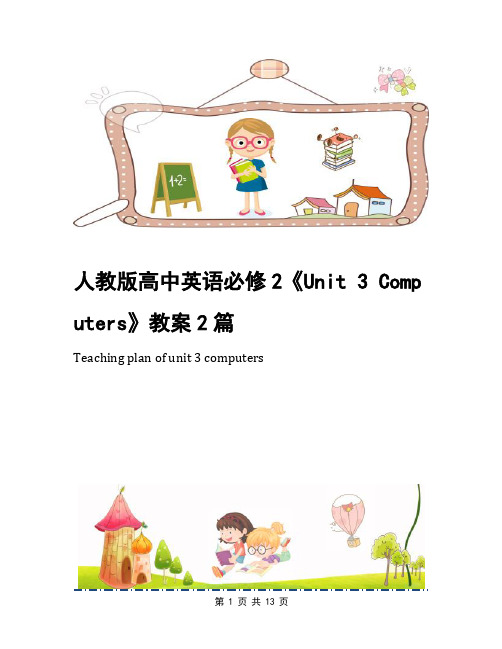
人教版高中英语必修2《Unit 3 Comp uters》教案2篇Teaching plan of unit 3 computers人教版高中英语必修2《Unit 3 Computers》教案2篇前言:英语作为在许多国际组织或者会议上都是必需语言,几乎所有学校选择英语作为其主要或唯一的外语必修课。
英语教学涉及多种专业理论知识,包括语言学、第二语言习得、词汇学、句法学、文体学、语料库理论、认知心理学等内容。
本教案根据英语课程标准的要求和教学对象的特点,将教学诸要素有序安排,确定合适的教学方案的设想和计划、并以启迪发展学生智力为根本目的。
便于学习和使用,本文档下载后内容可按需编辑修改及打印。
本文简要目录如下:【下载该文档后使用Word打开,按住键盘Ctrl键且鼠标单击目录内容即可跳转到对应篇章】1、篇章1:人教版高中英语必修2《Unit 3 Computers》教案2、篇章2:人教版高中英语必修2《Unit 3 Computers》教案篇章1:人教版高中英语必修2《Unit 3 Computers》教案教学准备教学目标1.To practise listening comprehension.2.To practise making decisions and reasoning教学重难点1.To practise listening comprehension.2.To practise making decisions and reasoning教学工具课件教学过程Step1.revision1.check the homework exercises.1). It has been reported that children will be offered free education.It has been reported that free education will be offered to children.2). It has been said that we will be offered the latest computer science course book.It has been planned that the latest computer science course book will be offered to us.3). I have been told by Peter that I will be lent his notebook computer for a week.I have been told by Peter that his notebook computer will be lent to me for a week.2.Question: What can computers be used as?Step2.Lead-inAs we know, science and technology is developing very fast and computers have become smaller and smaller. They have been used in many fields. So, the 21st century is the century of information technology What does it mean? Does information technology/ IT only mean things like computers? Of cause not. Actually, it means more than computers. Computers are just one kind of IT. What else do you know is part of IT?(TV, radio, CD-ROM, DVD, books……)Step3.Listening (SB)1.Pre-listening: What are the changes brought by different forms of IT ?What are the advantages and disadvantages ofthem ?2.While-listening:Go through the chart and make sure the students look at the chart before they listen to the tape. (This is to sharpen their attention and listen for the answers. This will also help them get the gist of the text.) Then Listen to the tape and finish filling in the chart. (If necessary, play the tape for several times.)Say: After listening to their talk, we know all kinds of IT have both disadvantages andadvantages.Let’s check the answers together.Type of IT Advantages DisadvantagesTV You can both listen and watch. You cannotwrite to friends.Web You can find information. It is very expensive.Radio You can listen to English. You cannot watch a film.Book You can get information. Sometimes it is out of date.3.Post-listening:1)(pair work): decide which type of IT is best for you to use right now. Make your choice and give your reasons by using the following expressions.I think that….In my opinion, ….I believe that….I agree because….I dis agree because….I’ve decided that….2)(group work): Discussion :Computers are useful and have brought us lots of good things, but they also cause bad effects. What attitude should we have towards the computer? (Make good use of it but never get trapped by it.)Step4.Speaking1.Pre-speakingSay: From what we have learn, we should admitthat computers and the web have a great influence on the school education as well as people’s life. It has come into people’s everyday life and many families hold computers in their homes. Now there is a task for you.2.While-speaking1) Situation: You have been asked by your parents to help choose computers for your home. You and your friend have looked at several computers. Talk about the special things each computer can do. Make a decision about which kind of computer to buy and explain why.Information input: Show students some pictures of different computers (desktop computer 特点______________4.科技;工艺 _______________5.目标,目的 n. ______________6.出现;发生vi. ______________7.解决;解答vt. _______________8.类型,打字 v.信号._________10.无论如何,即使如此adv. ______二.写出下列单词的变化形式1.operator n. 操作员; 接线员→_____________v. 操作; 经营→____________n. 操作; 经营2.technology n.工艺; 科技; 技术→_______________ adj. 科技的3.intelligence n.智力; 聪明; 智能→_________adj.智能的; 聪明的4.appearance n. 外观; 外貌; 出现→________________vi. 出现5.application n. 应用; 用途; 申请→_______________v. 应用; 申请→___________n. 申请人; 求职者6.explore vt. 探测→___________n. 探险家; 勘探者→_____________ n. 探索7.personal adj. 私人的; 个人的;→________adv. 就个人而言; 亲自→_________n. 个性; 人格;三、用所给词的适当形式填空(1)Can you say dolphins are much more ____________than other animals?Well, they are animals of high _____________. (intelligent)(2) She expressed her _________ opinion yesterday. ____________ speaking, I agreed with what she said. (personal)(3) Any ___________ who would like to_____________ to become anassistant in our company should send us an___________ .(apply)四、语境助记——词不离句,句不离段With the electronic technology revolution going on,simplified calculation is solved in the application on finance by universal exploration. Our goal of making life happier is certain to be realized through man's intelligence.五、翻译下列必背短语?1.在某种程度上_______________2.依…看;据…认为_____________3.从…时候起 _______________4.结果 _______________5.处理;安排;对付 ____________6.弥补,补足;整理,编造_________7.毕竟_______________?8.看守,监视 _______________9.在……帮助下_______________?六.根据句子意思写出单词的正确形式。
- 1、下载文档前请自行甄别文档内容的完整性,平台不提供额外的编辑、内容补充、找答案等附加服务。
- 2、"仅部分预览"的文档,不可在线预览部分如存在完整性等问题,可反馈申请退款(可完整预览的文档不适用该条件!)。
- 3、如文档侵犯您的权益,请联系客服反馈,我们会尽快为您处理(人工客服工作时间:9:00-18:30)。
Unit 3 ComputersPeriod One Warming up and ReadingBy Zhang SuochengTeaching contents:Warming up; Pre-reading; Reading; Comprehending (Page 17-19)Teaching important points:1. Students are able to learn more about the history and basic knowledge of computers.2. Students are able to learn different reading skills. Teaching difficult points:1.Help students to improve their reading abilities.2.Students are able to express their opinions.3.Help the students learn to use personification,chronology and topic sentences when writingTeac hing methods:1. Task-based teaching and learning2. Cooperative learning3. DiscussionTeaching aidsThe multimediaTeaching aimsKnowledge aims:1. Students are able to learn the useful new words and expressions in this passage2. Students are able to know basic knowledge about computers.Ability aims:1. Help students to improve their reading abilities.2. Train the students’ability to collect usefulinformation from the Internet by themselves.Emotional aim:Guide the students to work hard to create more wonderful and convenient inventions for human beings.Teaching procedureStep One Warming up1. Talk about the importance of computer and the Internet.2. Cooperative learning: Show some pictures of the development of computers.Questions: 1. What can you see in the pictures?(abacus, calculator, huge computer, PC, laptop, PDA, robot)2. What do you think will be the next development?Discussion (pair work): What do they have in common, in your opinion?Some useful expressions: I think that…In my opinion…I believe that… What’s your reason? Why do you think so?Step Two Pre-readingAsk the students to predict what the text is going to be about from the title and the pictures.Step Three While-readingTask 1: Skimming the passage for the general ideaQ 1: What is the main idea of the passage?This passage is mainly about the history of the development of computers.Q 2. Who am I?I am a computer.Task 2: Scanning for detailed information.Read the passage and finish the timeline below. (Ex. 1 on Page19)Task 3: Listen and read aloudTas k 4: Read the passage again. In pairs find out the topic sentence of each paragraph and the supporting details. (Ex.2 on Page19)Question & Summary: How to find out the main idea of a paragraph quicklyA topic sentence sets out / explains the main idea of a paragraph.A topic sentence is usually the first or the last sentence of a paragraph.Step Four Post-readingTask 5: Guessing gamesFind the word or expression for each of the following meanings from the text according to the context.(Ex. 1 on Page 20)Task 6: True or False?1. The passage mainly tells us the history of the computer.2. The computer was considered simple-minded before it got artificial intelligence.3. Charles Babbage invented the first computer.4. Since its birth the computer has been built to take the place of the human race.Step Five Brief summaryWhat have we learnt in this class?1) some words about computerscalculating machine, analytical machine, universal machine, PC, laptop,tubes, transistors, chips, network, World Wide Web, communications, finance, trade, robots, mobile phones, medical operations, space rockets2)the short history of the development of computersgreat changes in size—from__________ to ___________great changes in memory—from___________to ___________great changes in function—from___________to ___________great changes in application—from___________to ___________3) some scientists relating to computers________________built the analytical machine.________________made the first computer.4) some good methods of writinga. in the first person—personification “Who am I? ”b. in an order of time—chronologyc. topic sentencesStep Six Discussion in groups of fourWork in groups of four and discuss the advantages and disadvantages ofcomputers.Step Seven HomeworkRead the passage again. Underline the words, phrases or sentences that you don’t understand, and try to solve the problems using context clues and the dictionary.Design on the blackboardUnit 3 ComputersPeriod One Warming up and ReadingMain idea of the passage:This passage is about the history of the development of computers.Topic sentences of each paragraph:Paragraph 1: Over time I have been changed quite a lot.Paragraph 2: These changes only became possible as my memory improved.Paragraph 3: Since the 1970s many new applications have been found for me.Summary: What have we learnt in this class?1) some words about computers2) the short history of the development of computers3) some scientists relating to computers4) some good methods of writinga. in the first person—personification “Who am I? ”b. in an order of time—chronologyc. topic sentences品味人生1、不管鸟的翅膀多么完美,如果不凭借空气,鸟就永远飞不到高空。
